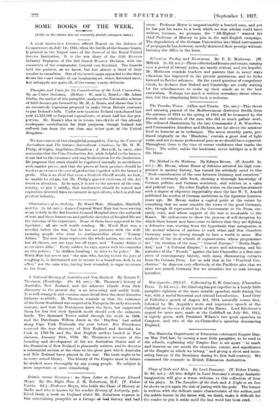The Method in the Ilfadneas. By Elwyn Bevan. (E. Arnold.
5s. net.)—Mr, Bevan, whose House of Seleucus attested his high com- petence in ancient history, has turned his scholarly mind to this " fresh consideration of the case between Germany and ourselvea." It is an extremely able book, showing a thorough knowledge of German politica and German sentiment, and written in a calm and judicial tone. No other English writer on the case has attained such a degree of objective impartiality since the late W. T. Arnold published his studies of German ambitions in the Speete.tor fourteen years ago. Mr. Bevan makes a capital point at the outset by remarking that we most consider the views of the good Germans, who, though ill represented in the Government or the Press, cer- tainly exist, and whose support of the war is invaluable to the Kaiser. He endeavours to show the process of self-deception by which these honest men have come to believe that they are fighting a defensive war, starting from the hypothesis that antagonism is the normal relation of nations to each other, and that therefore Germany must be strong enough to face a world in arms. His analysis of the rival schools of expansionists, whose programmes are " the freedom of the seas," " Central Europe," " Berlin-Bagh- dad," and "A Colonial Empire," is acute and informing, and his narrative of the " Fronde " against the late Chancellor is-a first-rate piece of contemporary history, with many illuminating extracts from the German Press. Let us add that in his "Practical Con- clusions" he disposes very effectively of the Pacificist plea that we must not punish Germany lest we stimulate her to seek revenge hereafter.


































 Previous page
Previous page